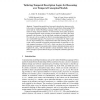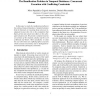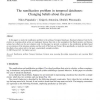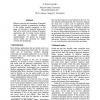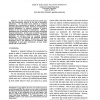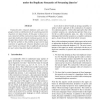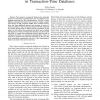164
Voted
FROCOS
2011
Springer
14 years 1 months ago
2011
Springer
Temporal data models have been used to describe how data can evolve in the context of temporal databases. Both the Extended Entity-Relationship (EER) model and the Unified Modelli...
107
click to vote
IJIS
2010
14 years 11 months ago
2010
In this paper we study the ramification problem in the setting of temporal databases. Standard solutions from the literature on reasoning about action are inadequate because they ...
110
click to vote
DKE
2006
15 years 2 months ago
2006
In this paper we study the ramification problem in the setting of temporal databases. Standard solutions from the literature on reasoning about action are inadequate because they ...
129
click to vote
SYRCODIS
2007
15 years 3 months ago
2007
Effective querying and managing of temporal databases represent an unanswered challenge to the modern research community. In this paper, we introduce a temporal preprocessor that ...
ESANN
2007
15 years 3 months ago
2007
In this paper, a new method for the determination of missing values in temporal databases is presented. This new method is based on two projection methods: a nonlinear one (Self-Or...
107
click to vote
VLDB
1992
ACM
15 years 6 months ago
1992
ACM
For the conventional relational model there has been considerable research in the area of incomplete information. On the other hand, research in temporal databases has concentrated...
104
click to vote
TIME
1997
IEEE
15 years 6 months ago
1997
IEEE
Temporal databases provide built-in supports for efficient recording and querying of time-evolving data. In this paper, data clustering issues in temporal database environment are...
102
click to vote
ICEIS
2003
IEEE
15 years 7 months ago
2003
IEEE
: This paper brings together two research areas, i.e. “Data Warehouses” and “Temporal Databases”, involving representation of time. Looking at temporal aspects within a dat...
139
click to vote
TIME
2007
IEEE
15 years 8 months ago
2007
IEEE
Transaction-time temporal databases and query languages provide a solid framework for analyzing properties of queries over data streams. In this paper we focus on issues connected...
150
click to vote
TIME
2009
IEEE
15 years 8 months ago
2009
IEEE
—Past research on temporal databases has primarily focused on state-based representations and on relational query language extensions for such representations. This led to many d...
